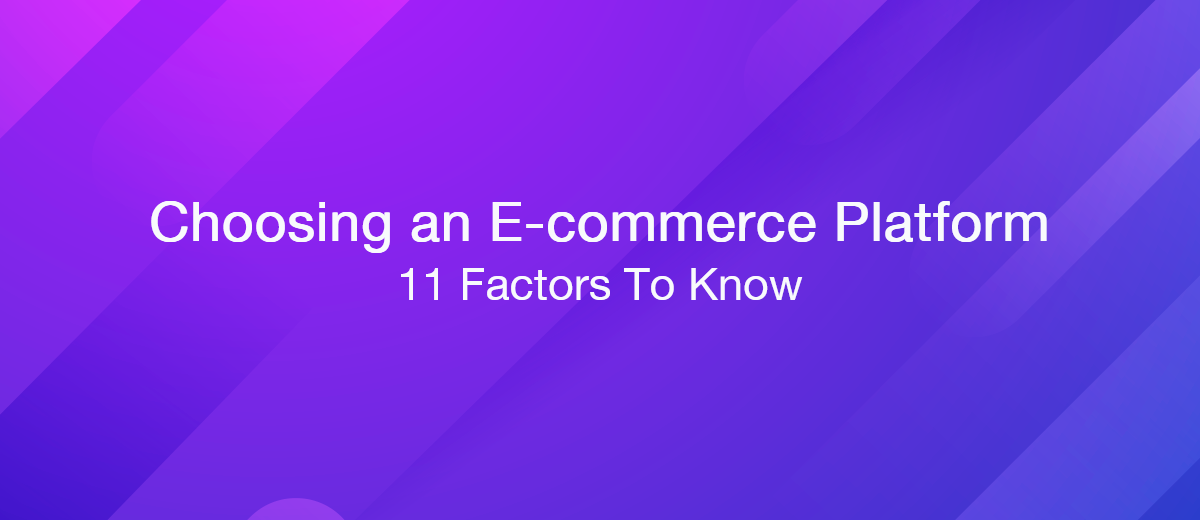How To Choose The Best Ecommerce Platform: 11 Factors To Know
Excited to start an online shop? This must be the best time to take the step. With today's trends and amazing eCommerce platforms, it is more than accessible for everyone to start an eCommerce store of their own. You can have a website up and running within 30 min, with all the tools and features that you need. And all that without writing a single line of code. That’s why eCommerce platforms are so popular and effective today.
But before you get caught up in anything else, here’s a complete guide to help you choose the best eCommerce platform for your online shop. Yes, there are dozens of platforms and each has there own pros. To choose the best eCommerce platform, here are 11 factors that you must consider before you pick the one. Also, we have curated a list of the 5 best eCommerce platforms that you must look at while making your final decision. Let’s get started.
Why is an eCommerce Platform Important in 2023?
Ecommerce platforms are all-in-one online software that helps in building, operating, marketing and growing an online store seamlessly, with less to no technical requirements. These are cloud-based software created to help everyone start an eCommerce store with ease and affordability. And that’s their main motto.
Compared to traditional means, there are many reasons why an eCommerce platform is important:
- Lower barrier to entry: You don’t need to have a technical background or a team of developers to create your online eCommerce store in 2023. All you need is an email, an idea, and a process to sell digital products online. This gives every new entrepreneur accessibility to start working on their ideas, build a website, set up their store, manage sales, and grow.
- Lower running cost: We know that with eCommerce platforms the cost of developing a site has been reduced significantly. But did you know the cost of running an eCommerce has also been reduced? Now, just one person can start an eCommerce from scratch. The platforms are built to help everyone, which is why they have easy-to-manage dashboards, integrations and features that are catering towards the idea of ease of doing business at affordable prices.
- Ease of scalability: You can start as a one-man show, and scale to an enterprise level with your eCommerce business. And in doing so, your platform will support you with every tool, feature and integration that you need. These highly collaborative features of the platform make a huge difference especially when you can add any feature or tool you want with just a few clicks.
- Dedicated support systems: The best part of about an eCommerce platform is that you always have specialized people to solve your problems. A good platform will provide support through various means to ensure that your business never stops. In case you hit a roadblock, you can contact the support team (or in some cases platform community) and they will be open to help you with all their abilities.
- Regular technological updates: One of the most important reasons to choose an eCommerce platform is the continuous advancement in the technology of the platform. Whatever the industry trend is. There is a dedicated team of world-class developers looking for solutions that are the best fit for your business. All you need to focus on is managing your store and attracting sales.
11 Factors to Consider While Choosing an eCommerce Platform
Hosting & Authority
The first thing that you must look at is whether or not the platform allows you complete autonomy over your store. When we talk about eCommerce platforms, we are not considering marketplaces like Amazon, Wayfair, Etsy etc which have their own set of rules and regulations that sellers have to follow.
Ideally, you want a platform that has no restrictions, and acts as a supporting technology in your business. This means, ensuring that your eCommerce is hosted on your separate domain name (for example, “YourOnlineStore.com”).
Learn if your platform provides hosting services as well. Buying hosting from the eCommerce platform provider is not necessary, but it does impact your web performance.The server space provided by the eCommerce platform is configured according to how the platform functions. This surely ensures smooth online operations of your eCommerce. Also, from a management point of view, there is one less separate technology to worry about.
Pricing Plan
Pricing is an important factor to consider when choosing an eCommerce platform. You have to make sure that you are getting all the tools and features that you need, and that the pricing model is still affordable.
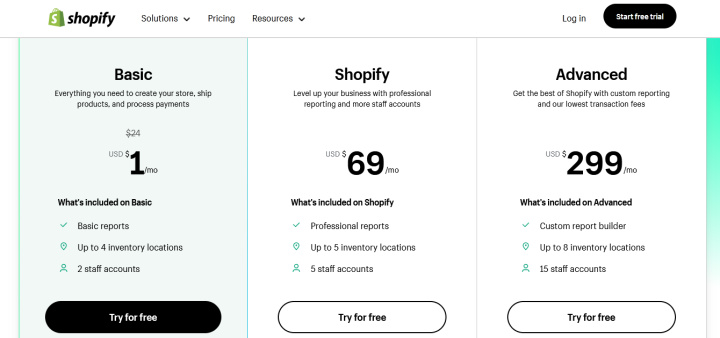
Here are a few questions that you must check while going through various pricing plans:
- Does this platform have all the features that I want?
- How much is the monthly fee of the platform?
- Are there any other commission-based charges while using the platform?
- What advanced features do I get compared to other platforms?
- Which of the many monthly plans is best suited?
- What’s the annual cost of the platform?
In most cases, these questions will help you understand if the pricing of the platform suits you.
Also, try not to cut down on the features you need for saving a few cents. Look at the pros of having what you need and finding the best plan for getting a good eCommerce platform.
Ease of use
The whole purpose of an eCommerce platform is the ease of using it to run your online store. If that purpose is defeated, all other pros are not worth it. So, when you are looking for an eCommerce platform, ensure that it is easy to use for you. How to know that? The best and most efficient way is to take the free trial that most eCommerce platforms offer. This way you’ll be able to judge by yourself if it was easy to get around and build a store with the platform.
While comparing the platforms, you shall also ensure that platform offers the functionalities that align with your needs. For example, BigCommerce offers functionalities to manage large inventories, whereas Wix offers higher design flexibility.
Both are great platforms but have different features and tools for an audience with different priorities. We will be looking at other eCommerce platforms and their special features to help you make a better decision.
Personalization
The question here is, does the platform allows you to make changes easily? In terms of how your eCommerce looks, how it functions, and what can you add or remove. If you are a small team and are just getting started you might be able to go ahead without much trouble. But when you are growing, you might need to make some core changes and that is when this factor comes into consideration.
Also, in the case of enterprises, there might be some changes that the management wants and in any scenario, one must be able to do that without breaking apart the whole system.
So, while choosing the platform you must make sure that the eCommerce platform gives you accessibility to personalize and edit your store the way you want — tools for minor updates and at least a code editor for major ones.
Functionality
Features and functionality of an eCommerce platform are very important factors to consider while making a decision. When you start comparing, you will be flooded with various functionalities and as a beginner, it can be overwhelming.
The best way to approach this is to find your non-negotiables. Functionalities that you won’t cut down on in any case.
Some of our top suggestions for non-negotiable functionalities are:
- You can easily operate it without a developer team.
- There are no restrictions on the number of products you can sell.
- The platform offers a wide variety of integration (apps and plugins).
- The platform is continuously updating as per market requirements.
- You have complete autonomy over what you sell on your eCommerce.
While these are just the basic functionalities, you can add more, such as managing eCommerce with a large team must be easy, it should have features to support dropshipping or print on demand etc depending on your business model.
Integration
Till now we have been talking a lot about tools, apps, plugins and integrations. What are those? In simple words, these are software created by other software services to assist you in running your business online.
This assistance can be in terms of marketing, managing inventory, creating campaigns, increasing website visitors and more. Your eCommerce platform must be working with other tools and services to make sure you get access to all the tools that you need from one dashboard. This will help reduce to hassle of managing multiple software, jumping from one tool to another, synchronising every action and a lot more.
Themes
What are the themes? Ecommerce themes are pre-made templates of your website that help you design how your store will look to customers.
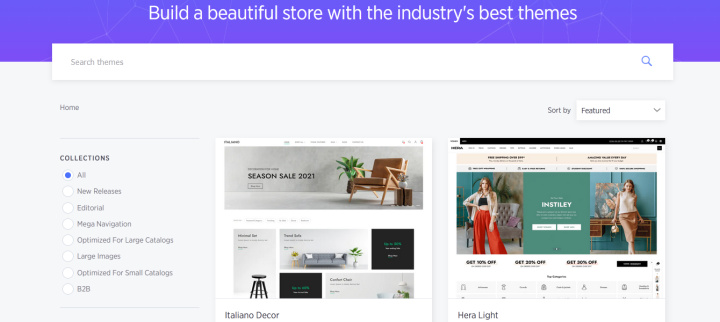
These are easy-to-edit templates, where you can edit the text, the images, the colours, your banner, the buttons, links and mostly everything in terms of how your entire site looks. Beyond that, you should think about ways to improve your business website design to create an easy-to-use experience for your users.
Many eCommerce platforms provide free and paid themes. Having access to this library is very helpful as it allows you to make edits with easy drag-and-drop features on your eCommerce.
SEO & Mobile Friendly
SEO stands for search engine optimization. That’s how Google and other search engine determine the ranking of your website in the search result. There are various factors like speed, security, website design, readability of content, how users engage and much more that search engine tracks to determine how good of a result you are for the people who are looking to buy a product.
Your eCommerce platform should be technically compatible with search engine guidelines. Additionally, it should allow you to easily make SEO-friendly changes in your website so you can optimize to improve your ranking, attract more visitors and eventually get more sales.
By 2025, it is protected that 44% of all eCommerce sale will through mobile. That means the majority of your customers will be visiting your online store, through mobile. This is why you must make sure that your theme and eCommerce platform are easily accessible through mobile as well.
Your eCommerce should look engaging, your texts should be easy to read and your mobile visitors should easily place an order if they like your products. The main goal is to give the best online customer experience on your eCommerce.
Scope of Scalability
Today, you might start with just 10 products and get 100 orders a month. If you continue that, it’s great. But if you want to scale your business from 10 products to 10,000 and manage millions of orders—your platform should have capabilities to assist you. Ideally, you are looking for a platform that you can use at any stage of your eCommerce journey. It is very important to consider this factor.
If you plan to grow your eCommerce, shifting from one platform to another will be a lot of hard work and mess-ups that you would surely like to skip. So, ensure that the platform you choose is good for small and even large-size eCommerce as well.
Payment Gateways
What are payment gateways? Payment gateways are online applications that allow you to accept payments from your customers. Now you know how important it is to consider this factor. After all, you want to make sure your eCommerce has smooth, safe and easy ways to receive payments from your customers.
You should also make sure that the platforms allow you to accept payments through various means—the most popular ones being Paypal, credit cards, debit cards, online payment etc.


If you can add in other payment gateway tools like Razorpay, Stripe, Apple Pay etc through plugins or apps, it is much better. Customers trust these tools and are likely to place their orders without any security concerns.
Customer Support
Customer support plays a huge role in determining if the eCommerce platform is right for you or not. The last thing you want is to get stuck and not be able to contact the team to help you resolve your issues.
That is make sure that the eCommerce platform you choose offers a wide options of for customer support. This can be in form of a knowledge base, live chat support, email or even a call widget.
If you are a non-techie this is even more important. Make sure that the platform of your choice is providing some kind of support in all types of plans they offer. And in case you hit a roadblock in your eCommerce journey, always feel free to ask for help.
5 Best Ecommerce Platforms for 2023
Shopify

Shopify is the best eCommerce platform for everyone. It is a platform that comes gave everyone the ease and ability to start an eCommerce, reach their customers, and scale their business. The platform is created for beginners, so it is very easy to use. One can easily get started with their store within 30 min and start selling products online.
In addition to that, Shopify has been a community favourite tool for starting an eCommerce for beginners. You get access to all the tools you need in one place. And then, if you need any other feature, you can easily install an app from your Shopify Appstore. Want to update the way your website looks? You have access to free themes that you can install and start editing with easy drag and drop.
All this and much more makes Shopify one of the best eCommerce platforms in 2023 for beginners as well as a whole enterprises.
Pros:
- Easy-to-use platform
- Scalability of eCommerce is easy
- Gives access to various tools and themes
- The pricing plan is affordable
- Has a great support team in case of a problem
Cons:
- None
Yo!Kart
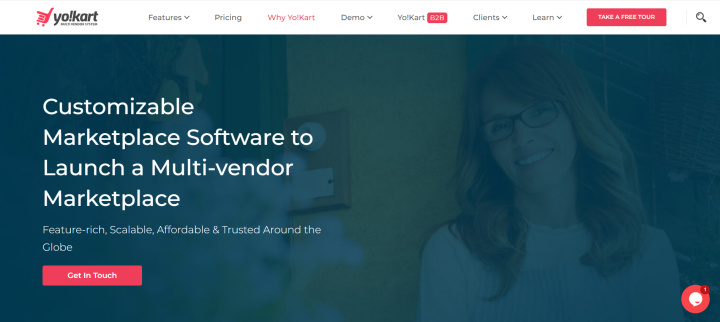
Yo!Kart is a multi-vendor eCommerce platform that enables businesses to create and manage their online stores. It provides a comprehensive set of tools and features for setting up and running an online marketplace, including a user-friendly interface, payment gateways, order management, shipping and tax calculation, customer management, marketing and SEO tools, and much more.
With Yo!Kart, multiple vendors can sell their products through a single platform, creating a marketplace that offers a wide range of products to customers. The platform also allows for seamless communication between vendors and customers, making it easier to manage orders and resolve any issues.
Yo!Kart is a highly customizable ecommerce marketplace software that can be tailored to meet the specific needs of different types of businesses. This makes it an ideal solution for businesses looking to start an online marketplace, as well as established marketplaces looking to expand their offerings.
In summary, Yo!Kart is a robust and versatile eCommerce platform that provides businesses with the tools they need to create and manage a successful online marketplace.
Pros:
- Yo!Kart is highly customizable, which means that businesses can tailor the platform to meet their specific needs and requirements.
- Yo!Kart has a user-friendly interface that makes it easy for businesses to manage their online stores and for customers to browse and purchase products.
- Yo!Kart is built on a robust and secure technology stack, providing businesses with peace of mind that their online stores are safe and secure.
- Yo!Kart is designed to be scalable, making it an ideal solution for businesses of all sizes, from start-ups to established enterprises.
Cons:
- No themes are available in the GoQuick package.
- Time-consuming for novice users.
Woocommerce
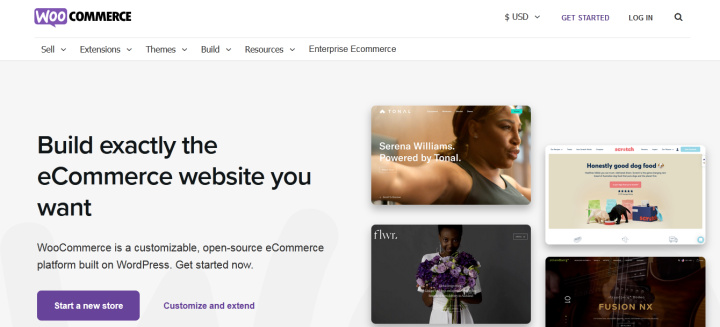
Woocommerce is a free WordPress plugin that gives you accessibility to turn your regular WordPress blogging site into an eCommerce. If you have ever used WordPress, running a Woocommer store would not be a hassle.
And most importantly, you get access to all other features and tools that WordPress offers. These features would be the ability to create a blog post, access to the large library of plugins and themes, a huge WordPress community and more. So, if you have ever used WordPress for your website, Woocommerce might be the best eCommerce platform for you.
Pros:
- There are no fees for basic eCommerce features
- You can manage your eCommerce from your WordPress dashboard
- Access to all WordPress plugins and themes
- Blogging functionality to attract traffic to your store
- A large community and support to assist you
Cons:
- Over time site security has been a regular concern
BigCommerce
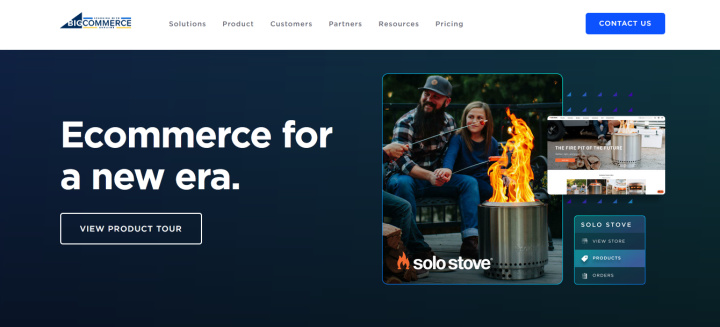
BigCommerce is an eCommerce platform, built for large eCommerce. Where all other platforms help small retail businesses, BigCommerce is the platform built for the enterprise. Even if you have 10,000+ products and their variants, it is much easier to manage them in BigCommerce compared to any other platform.
And just like any enterprise eCommerce would need, this platform gives you all the tools to manage large inventory, sales and customer experience with ease. BigCommere is also considered among the best SEO-optimized eCommerce platforms of all.
Pros:
- Best platform for big eCommerce
- Managing large inventory is easy
- Has various features to support and optimize customer experience
- Working with large teams on this platform is easy
- From an SEO perspective, this is the best platform
Cons:
- For small retail eCommerce, BigCommerce is an overkill
Squarespace
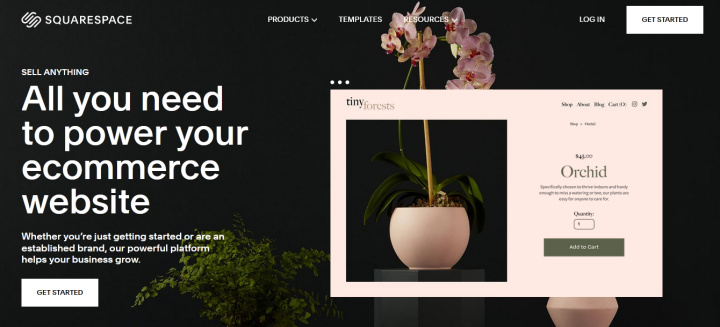
Squarespace as an eCommerce platform caters for a very particular group of people. One with less than 100 products. It is a very new platform and has still managed to attract a lot of customers because of its ease of use and the design template it offers.
In addition to that, it has impressive SEO tools that make it even a great choice for entrepreneurs that only have a few products to sell.
Pros:
- Easy to get started
- Less complicated tool than others
- Design templates are very attractive
- Highly robust SEO tools
Cons:
- Scalability is very difficult
- Very limited integration
Wix
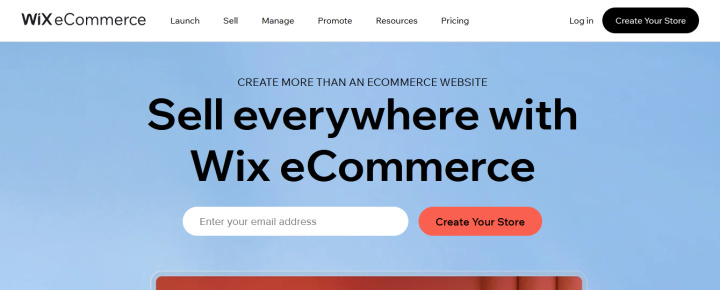
Wix is an eCommerce platform, build for the design enthusiast. With Wix, you can edit every single element on your eCommerce platform and ensure that your store looks exactly the way you want.
You get access to over 500+ theme templates that you use to set up your store. At the same time, Wix also ensures great security for your eCommerce.
Getting started with Wix is very easy, and you’ll be guided all along the way. But again, it is the best choice of platform for eCommerce with less than 100 products.
Pros:
- Design flexibility
- Easy to get started
- Highly secured platform
- Easy to hire Wix experts to assist you
Cons:
- Limited integration
- Not for a large inventory
Next Step for Your Online Shop
Finding the right eCommerce platform is essential, which is why one must make sure of doing proper research. Above, we shared 11 factors to consider while choosing an eCommerce platform. These factors are based on various metrics such as ease of use, scalability and the performance of the platform and that’s what matters the most.
If you want to go one step further and manage all your customer relationships, nurture them, and offer exceptional customer support, you can natively integrate Shopify, WooCommerce, and BigCommerce with EngageBay.
EngageBay is an all-in-one marketing, sales, and customer support software designed for small businesses. It offers omnichannel marketing, lead capture forms, email marketing, deal management, telephony, landing pages, helpdesk, and live chat – all in one easy-to-use platform.
Lastly, to make your final decision, don’t hold back on trying all the best eCommerce platforms we shared. This will surrey help you in making the decision much more effectively and give you a real insight into what using the platform would be like.
Do you want to achieve your goals in business, career and life faster and better? Do it with ApiX-Drive – a tool that will remove a significant part of the routine from workflows and free up additional time to achieve your goals. Test the capabilities of Apix-Drive for free – see for yourself the effectiveness of the tool.
